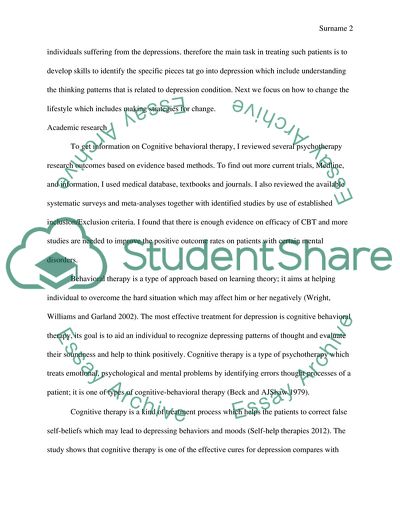Cite this document
(How People Overcoming Depression by Using a Cognitive Behavioural Essay Example | Topics and Well Written Essays - 2500 words, n.d.)
How People Overcoming Depression by Using a Cognitive Behavioural Essay Example | Topics and Well Written Essays - 2500 words. https://studentshare.org/psychology/1791066-how-people-overcoming-depression-by-using-a-cognitive-behavioural-therapy-approach
How People Overcoming Depression by Using a Cognitive Behavioural Essay Example | Topics and Well Written Essays - 2500 words. https://studentshare.org/psychology/1791066-how-people-overcoming-depression-by-using-a-cognitive-behavioural-therapy-approach
(How People Overcoming Depression by Using a Cognitive Behavioural Essay Example | Topics and Well Written Essays - 2500 Words)
How People Overcoming Depression by Using a Cognitive Behavioural Essay Example | Topics and Well Written Essays - 2500 Words. https://studentshare.org/psychology/1791066-how-people-overcoming-depression-by-using-a-cognitive-behavioural-therapy-approach.
How People Overcoming Depression by Using a Cognitive Behavioural Essay Example | Topics and Well Written Essays - 2500 Words. https://studentshare.org/psychology/1791066-how-people-overcoming-depression-by-using-a-cognitive-behavioural-therapy-approach.
“How People Overcoming Depression by Using a Cognitive Behavioural Essay Example | Topics and Well Written Essays - 2500 Words”. https://studentshare.org/psychology/1791066-how-people-overcoming-depression-by-using-a-cognitive-behavioural-therapy-approach.


